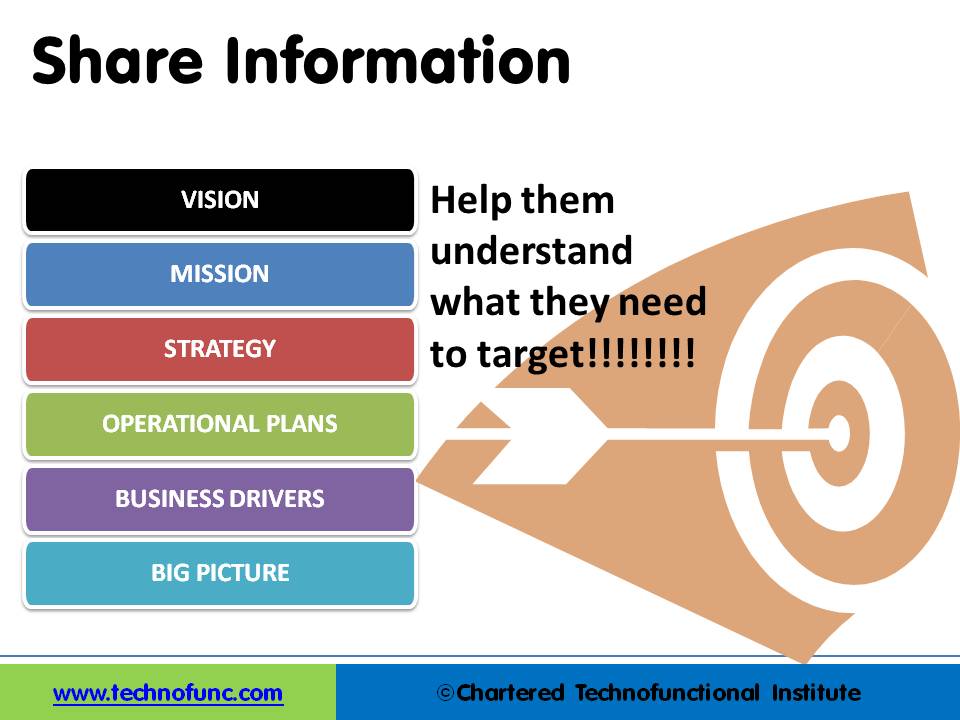- Home
- Business Processes
- Industry Knowledge
- Aerospace Industry
- Automotive Industry
- Banking Domain
- BFSI Industry
- Consumer/ FMCG Industry
- Chemicals Industry
- Engineering & Construction
- Energy Industry
- Education Domain
- Finance Domain
- Hospitality Domain
- Healthcare Industry
- Insurance Domain
- Retail Industry
- Travel and Tourism Domain
- Telecom Industry
- Leadership Skills
- eLearning
- Home
- Leadership Skills
- Team Leadership
- Share Information with Your Team
Share Information with Your Team
Willingness to share information is the most critical and the very first step in the Journey to employee empowerment and team development. People cannot make good technology or business decisions without information. They need to understand the purpose behind what they are doing and connect with the big picture. People with information feel the need to take the risk of making decisions that enable business growth.
Share the Vision & Mission of the Organization
As a leader, it is advisable to make sure that people know and have access to the organization's overall mission, vision, and strategic plans. Sharing this information helps them to feel that they are part of, and contributing to, something bigger than themselves and their individual job. Create a vision for your team that aligns with the overall vision of the organization. Share the most important goals and direction for your team and in the process; ensure that everyone has a clear picture of what success will look like. People who understands where they need to go are much more likely to get there - “start with the end in mind”.
Demonstrate a clear vision to your team. Let your team know what you are planning, strategically, to accomplish over the long run. Empower your team to innovate and think out of box to support the big vision.
Help them understand the Strategy & Business Drivers
Once empowered, to take the right decisions, people must understand how the company generates money, what the expenses are, and how it makes a profit. To achieve this, share the key financial data and provide meaningful explanations of these figures. Show people how their jobs are tied to these results and how empowered performance can have a positive impact on the numbers. They need to understand the business drivers and how they can relate the same with their respective process areas. How their individual goals are helping the organization to solve the bigger business problems.

Link Strategy & Operational Plans to Employee Performance
The successful deployment of your strategy is dependent upon managers' and employees’ discussions of that strategy and the sooner teams adjust their spending to the priorities best aligned with business strategy, the higher the return on those investments. Managers should aim to link the strategic and operational plans to individual performance. This would result in a heightened level of project ownership and increased teamwork as they will be able to relate to the business value that they are working upon. If employees don’t know the details of your strategy, how can they make adjustments to the thousands of decisions and actions that they make on a daily basis? They can’t. By having a first-hand understanding of your company’s business strategy, your workforce will have the shared strategy context needed to quickly implement operational change to meet new customer demands and fend off competitors’ emerging efforts.
Enable them to Focus on Big Picture
Team leaders should help their direct reports connect their learning goals to wider company objectives and ensure that team members have the time and resources they need to reach their goals. Start building your team’s business process understanding by leveraging technofunc’s functional training. Whether the learner is a team leader or team member, or both, they will learn how to be effective team players and team leaders, solve problems, and work towards common goals via highly interactive case studies, exercises, and use of TechnoFunc resources.
Information Drives Productivity
Sharing information helps people understand why change and improvement are necessary to resolve business challenges and stay competitive. The importance of change in business environments allows employees to learn new skills, explore new opportunities, and exercise their creativity in ways that ultimately benefit the organization through new ideas and increased commitment. Understanding of the real business issues motivates people to use their knowledge and experience, to improve the business processes and drive productivity.
Related Links
You May Also Like
-
Generating Ideas using SCAMPER
SCAMPER is an activity-based thinking process that can be performed by Cooperative learning. SCAMPER is an acronym that provides a structured way of assisting students to think out of the box and enhance their knowledge. This can be used in the organizational context as a technique for creative problem solving and as a toolkit to generate fresh ideas.
-
Time management is the process of planning and exercising conscious control of time spent on specific activities, especially to increase effectiveness, efficiency, and productivity. The best time management techniques improve the ways you work. Time management refers to managing time effectively so that the right time is allocated to the right activity. Learn more about the five steps for effective time management viz. study, identify, analyze, decide, and implement.
-
In this study of power, Raven identified five bases of power as coercive, reward, legitimate, referent, and expert. The 5 Types of Power can help you decide when it is appropriate to use a particular type of power in important situations. Leadership involves authority and it is very important for leaders to understand what type of power they're using.
-
Evidence of the medically damaging symptoms of work stress necessitates applying the treatment of stress management. Stress management is increasingly drawing the attention to the management experts not only as a remedial measure but also as a way to resource management. If the workplace can be made a little more lovable the increase in the achievement of the organization may be much time more. If group stress can be removed by introducing group discussions and recreational facilities a long-lasting team spirit may get developed.
-
A manager or an employee in an organization who is experiencing a high level of stress may develop high blood pressure, ulcers, irritability, difficulty in making routine decisions, loss of appetite, accident proneness, and the like. These can be subsumed under three general categories, physiological, psychological, and behavioral symptoms. Stress can give rise to a number of changes.
-
Collaborative leadership is all about collaborative problem-solving and decision-making or can also be defined as the leadership of a collaborative effort. . The term started to appear in the mid-1990s in response to the formation of long term public-private partnerships to rebuild public infrastructure. Learn how you can use principles of collaborative leadership to enhance your leadership skills for being an effective leader.
-
Facilitative Leadership is all about involving the employees in the decision-making process at all levels enhancing their sense of ownership, responsibility, and motivation. Facilitative leadership style uses a number of indirect communication patterns to help the group reach consensus and build commitment for the decision taken. To be effective in modern organizations, managers need to become facilitative leaders, learn what it means to be a one.
-
Share Information with Your Team
Willingness to share information is the most critical and the very first step in the Journey to employee empowerment and team development. People cannot make good technology or business decisions without information. They need to understand the purpose behind what they are doing and connect with the big picture. People with information feel the need to take the risk of making decisions that enable business growth.
-
Narrative leadership is interpreted as the leader who aspires to construct leadership by telling stories. Leadership is a task of persuasion, of winning people’s minds and hearts. Storytelling is thus inherently suited for the task of leadership. Learn about the narrative leadership style and how to use this style to inspire and motivate followers or to manage change.
-
Team Development by Building Trust
As your team begins to work together, you need to establish a way each team member can exchange ideas and build mutual trust. Successful groups are built on trust and collaboration. A free exchange of ideas, in an open environment, will allow your team to get to know each other and enable you to check on how they work together. Learn some tips to help build team trust and establish personal bonds.
Explore Our Free Training Articles or
Sign Up to Start With Our eLearning Courses

About Us
Learning
© 2023 TechnoFunc, All Rights Reserved










